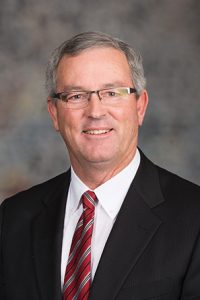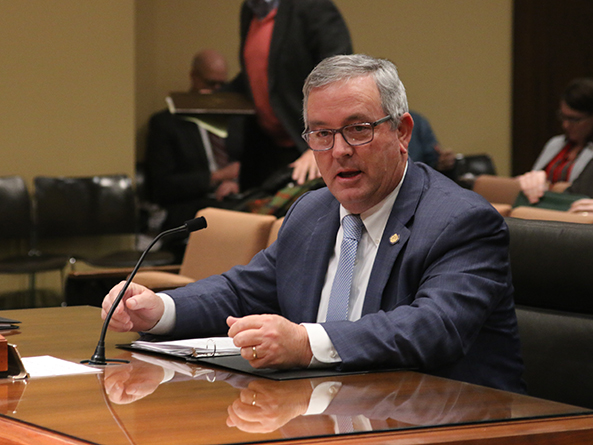Legislative finding on land and water rights proposed
The Natural Resources Committee heard testimony Jan. 22 on a proposed legislative finding regarding the separability of groundwater rights and land ownership.
Under LB802, introduced by Sen. Dan Hughes of Venango, the Legislature would find and declare “that the right to use groundwater is an attribute of owning fee simple title to land overlying the source of the groundwater and is inseparable from the land to which the right applies.”
That provision would not apply to exceptions the Legislature has created regarding municipal and industrial groundwater transfers, among others. It also would not change the regulatory authority granted to the state Department of Natural Resources under the Nebraska Ground Water Management and Protection Act.
Hughes said LB802 would codify Nebraska common law, which, with those few exceptions, links the reasonable, beneficial use of groundwater to ownership of the overlying land. He said he introduced the bill on behalf of the Nebraska Cattlemen and the Nebraska Farm Bureau to address their concerns about recent efforts to separate water rights from land ownership.
“Such a practice would set a dangerous precedent that could lead to groundwater rights being bought and sold as a commodity,” Hughes said. “This could have a negative impact on irrigators, the sustainability of water resources and upon the ag industry as a whole.”
Chris Schluntz, chairman of the Nebraska Cattlemen’s natural resources and environment committee, testified in support of the bill. He said allowing water rights to be separated from land ownership and sold to the highest bidder would hurt farmers and ranchers because they would have to purchase water rights in addition to new land when expanding their operations.
“Allowing even the potential of separating the ownership of access to groundwater from the land ownership puts the state’s No. 1 economic driver at undue risk, unnecessarily increasing operating cost,” Schluntz said.
Don Blankenau, a private attorney in Lincoln, also testified in support on behalf of the Nebraska Association of Resources Districts. He said codifying the common law would preserve natural resources districts’ existing rules and regulations and allow lawyers to reference a single statute rather than several court decisions.
Testifying in opposition to LB802 was Jeff Fassett, director of the state Department of Natural Resources. He said any changes to state law regarding transfers of groundwater could jeopardize two streamflow augmentation projects that help Nebraska comply with a multistate compact governing water use in the Republican River basin.
Nebraska courts already have settled the issue of separating groundwater use from land ownership, Fassett said, and a clarification of the common law in statute only would create the risk of new lawsuits.
“Nebraska’s water laws are a complex, interrelated system that begs for stability and legislative caution because imprecise words can create unintended consequences that will lead to litigation,” he said. “It is simply the nature of the beast.”
The committee took no immediate action on the bill.


